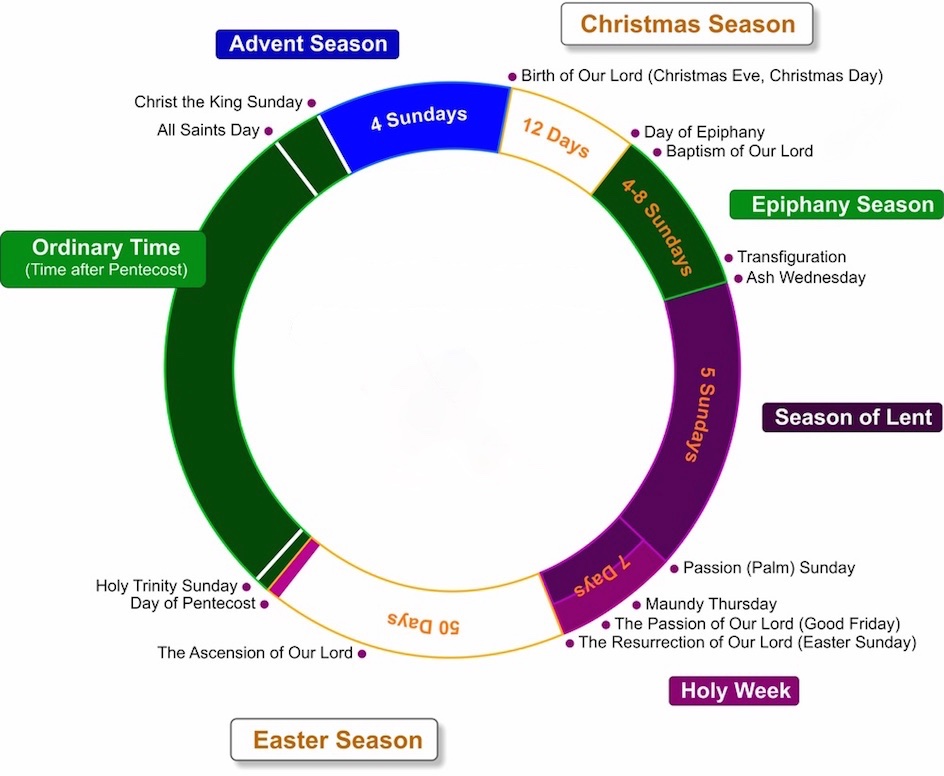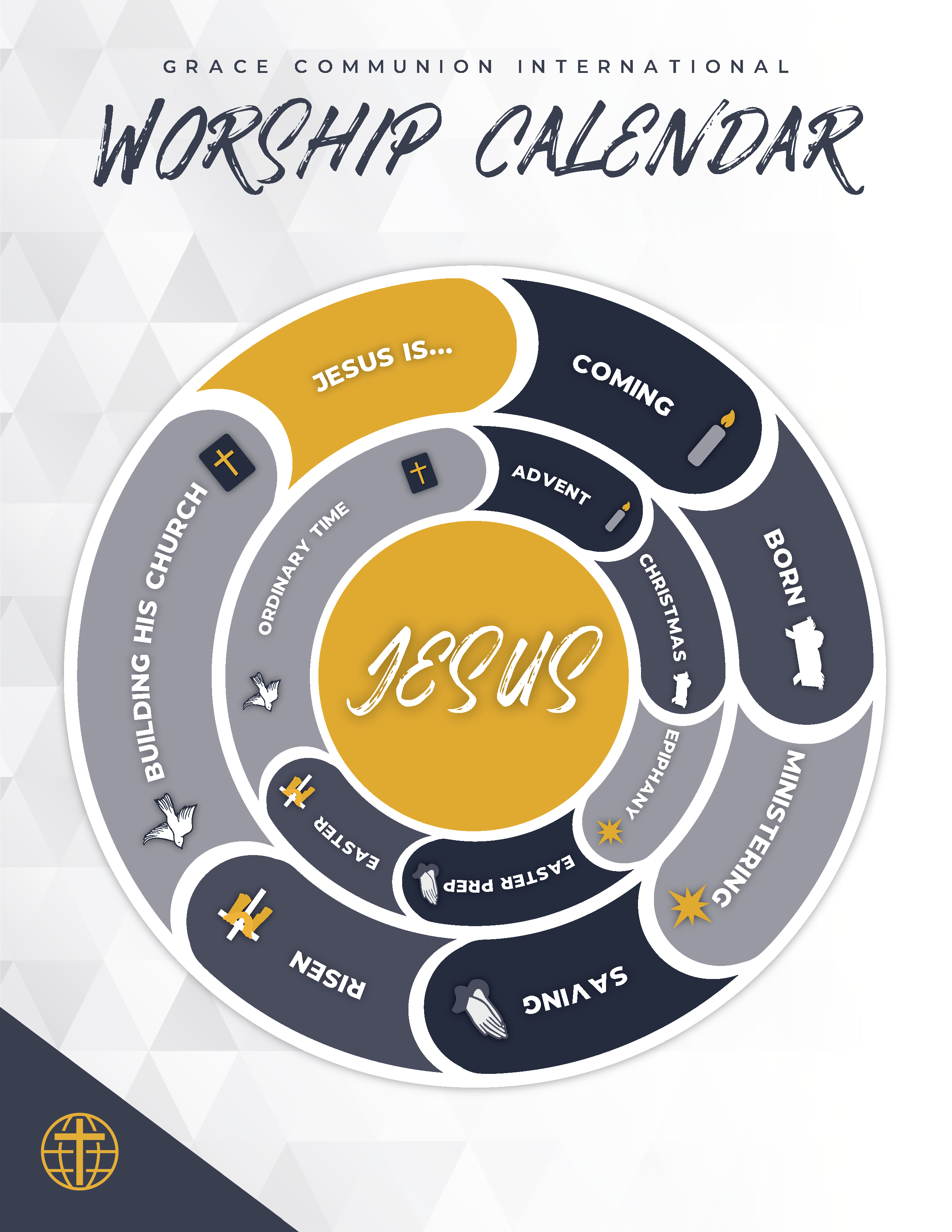Worship is the divinely created response to the glory of God. It is motivated by divine love and springs from God’s revelation of himself in communion with his creation. Through the church’s worship, believers commune with God the Father through Jesus Christ by the Holy Spirit. Worship involves humbly and joyfully giving God priority in all things and is expressed in such actions and attitudes as prayer, praise, celebration, generosity, acts of mercy, and repentance.
The worship of God in ancient Israel was organized around seven festivals based on the agricultural year. Linked together in an annual cycle, these festivals looked back on God’s great acts on behalf of Israel—delivering her from Egypt and forming her into the people of God from whom the Savior of the world would come. By God’s design, Israel’s festivals also looked forward, foreshadowing the coming of Jesus into the world (Col. 2:16-17). In that way, these festivals served as a “schoolmaster” to point the people of Israel to Jesus, the promised Messiah (Gal. 3:24, KJV). With the Messiah’s coming, the schoolmaster’s role ended (Gal. 3:25, KJV) and, for the New Testament church, Israel’s form of worship was replaced by one focused directly on Jesus—on who he is and what he has done for the salvation of all the world, in fulfillment of the Old Testament promises (Acts 13:32-39).
Early on, Christian worship focused on the resurrection of the crucified Lord Jesus Christ, celebrated weekly on Sunday (the day Jesus rose from the dead and was first encountered by his disciples) and annually on Easter. Over the centuries, the liturgical year was filled out with Christ-centered celebrations and commemorations, resulting in the annual worship calendar shown below (click to enlarge)—one that is used by many churches in our day.
 The annual worship calendar begins in late November (or early December) with Advent Season. The first half of the worship year focuses on key events in the life and ministry of Jesus and the second half, called Ordinary Time (or the Time after Pentecost) focuses on living out what was learned during the first half. Throughout the year, the church’s worship is expressed in words and actions themed to the particular season: songs and hymns, spoken prayers, proclamation of the Word of God in Scripture reading and preaching, and partaking of the Lord’s Supper (also called Communion and the Eucharist). To assist its congregations in following the Christian worship calendar, GCI provides sermons for each Sunday and some of the additional special worship days. These sermons are synced with the Scripture readings set out in the Revised Common Lectionary. To view the sermons published to date in GCI Equipper, click here.
The annual worship calendar begins in late November (or early December) with Advent Season. The first half of the worship year focuses on key events in the life and ministry of Jesus and the second half, called Ordinary Time (or the Time after Pentecost) focuses on living out what was learned during the first half. Throughout the year, the church’s worship is expressed in words and actions themed to the particular season: songs and hymns, spoken prayers, proclamation of the Word of God in Scripture reading and preaching, and partaking of the Lord’s Supper (also called Communion and the Eucharist). To assist its congregations in following the Christian worship calendar, GCI provides sermons for each Sunday and some of the additional special worship days. These sermons are synced with the Scripture readings set out in the Revised Common Lectionary. To view the sermons published to date in GCI Equipper, click here.
Primary worship days and seasons
Here is a list of the primary worship days and seasons in the Western Christian worship calendar. Some churches celebrate all of these, others only some. GCI asks its congregations to celebrate (as a minimum) the days/seasons of Advent, Christmas, Holy Week and Easter. For additional information and resources related to this worship cycle, click here.
- Advent Season—spanning the four Sundays prior to Christmas
- Christmas Season—beginning with Christmas Day on December 25 and continuing through January 5
- Epiphany Season—beginning with the day of Epiphany on January 6 and continuing to the day before Ash Wednesday—the season includes the Baptism of our Lord (the Sunday after the Epiphany) and Transfiguration Sunday (the Sunday before Ash Wednesday)
- Season of Lent—beginning with Ash Wednesday and continuing through Holy Saturday (thus overlapping Holy Week)
- Holy Week
- Passion (Palm) Sunday
- Maundy Thursday
- Good Friday
- Holy Saturday
- Easter Season—beginning with Easter Sunday and continuing to Pentecost, including two special celebrations:
- Easter Sunday—celebrating Jesus’ resurrection
- The Ascension of our Lord—40 days after Easter Sunday
- Day of Pentecost
- Ordinary Time—the period following Pentecost until Advent Season, including three special celebrations:
- Holy Trinity Sunday—the Sunday following Pentecost
- All Saints Day—held the weekend after Halloween
- Christ the King Sunday—the Sunday before Advent Season begins
* Reproduced from The GCI article, GCI: The Church’s Worship Calendar, updated September 22, 2018.
The worship of God is central to the life of God’s people in all ages. Israel’s worship (under the old covenant) centered on the Tabernacle-Temple daily sacrifices with weekly and annual sacred assemblies (Lev. 23). God’s intent for this form of worship was to point his people to Jesus, their Messiah (Gal. 3:24-25). Following Jesus’ death, resurrection and ascension, and the outpouring of the Holy Spirit, the worship of the newly formed church (under the new covenant) focused directly on Jesus. Over time, this worship took on the pattern shown in the diagram below, with church services focused on proclaiming the gospel through Word (Scripture reading, preaching and singing), sacrament (Lord’s Supper and baptism), prayer and the giving of offerings.

GCI’s standard worship pattern
Along with many others in the body of Christ, worship in Grace Communion International follows the Christ-centered, gospel-shaped pattern of the Western Christian calendar shown in the diagram above and detailed in the Revised Common Lectionary (RCL). This pattern has the weekly and annual components described below.
Weekly
GCI’s weekly worship services focus on celebrating the gospel of Jesus Christ. These services are typically held on Sunday (the day our risen Lord was first encountered). For a suggested order of services (liturgy) for the weekly service, click here.
Annual
Worship in GCI follows the historic and orthodox pattern of annual worship set forth in the RCL and shown in the diagram above. Worship during the first half of the year focuses on the Story of Jesus and during the second half of the year on the Story of the People of God—a story that emphasizes discipleship.
Here is a list of the annual celebrations (click on the links for additional detail):
- Advent Season—spanning the four Sundays prior to Christmas
- Christmas Season—begins Christmas Day (Dec. 25) and continues through Jan. 5
- Epiphany Season—begins with the day of Epiphany (Jan. 6) and continues to the day before Ash Wednesday—the season includes the Baptism of our Lord (the Sunday after the Epiphany) and Transfiguration Sunday (the Sunday before Ash Wednesday)
- Season of Lent—begins with Ash Wednesday and continues through Holy Saturday (thus overlapping Holy Week as seen in the diagram above)
- Holy Week:
- Palm/Passion Sunday
- Maundy Thursday
- Good Friday
- Holy Saturday
- Easter Season—begins with Easter Sunday and continues to Pentecost, including two special celebrations:
- Easter Sunday—celebrating Jesus’ resurrection
- The Ascension of our Lord—40 days after Easter Sunday
- Pentecost Sunday—50 days after Easter Sunday
- Ordinary time—the season between Pentecost and Advent, including three special celebrations:
- Holy Trinity Sunday—the Sunday after Pentecost
- All Saints Day—the weekend after Halloween
- Christ the King Sunday—the Sunday before the start of Advent Season
Liturgies for church services & ceremonies
To assist congregations in following its standard worship pattern and content, GCI publishes RCL-synced sermons in GCI Equipper (click here to access) and the following liturgies for worship services and church ceremonies (click on the links below to download each one as a Word file).
- Weekly worship service
- Communion (The Lord’s Supper)
- Baptism
- Baptism of an infant
- Blessing of a child
- Confirmation
- Wedding
- Renewal of marriage vows
- Anointing the sick
- Funeral
- Commissioning of a ministry leader
- Ordination of an elder
- Installation of a pastor
Flexibility granted
GCI congregations may adapt the denomination’s standard liturgies to accommodate local customs and needs (though the basic formats and content should be followed). Congregations also may adapt GCI’s standard pattern of worship, though all are to provide services celebrating Jesus’ birth during Christmas Season and his resurrection during Easter Season. It is recommended that each of the other key aspects of the gospel, listed at left, be celebrated in a weekly worship service at the designated time of year.
GCI congregations may hold their primary weekly worship service on any day of the week, though Sunday is the norm. Congregations may determine how often to offer the Lord’s Supper, though it should be offered no less than quarterly, and at least once during Holy Week. Offering the Lord’s Supper every week is recommended.
In making decisions concerning adaptations to GCI’s standard worship pattern and liturgies, congregational leaders should seek divine guidance, understanding that worship is the divinely created response to the glory of the triune God revealed in Jesus Christ.
Additional resources
Here are some additional worship resources:
- GCI.org articles about worship
- Surprising God blog posts concerning the Christian calendar
- GCI Equipper article on the power of liturgy in shaping worldview
- GCI Equipper article on preaching from the Revised Common Lectionary
